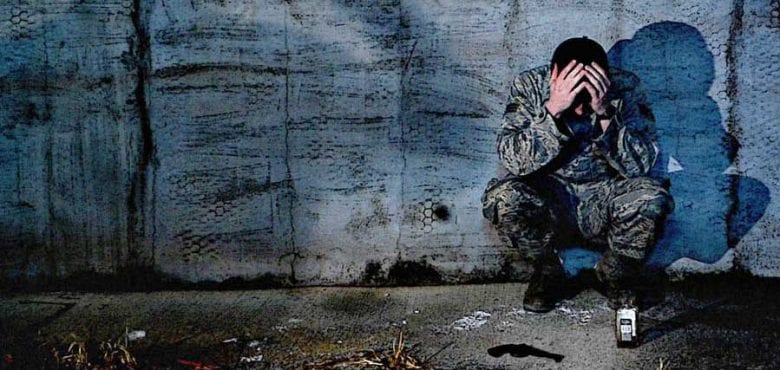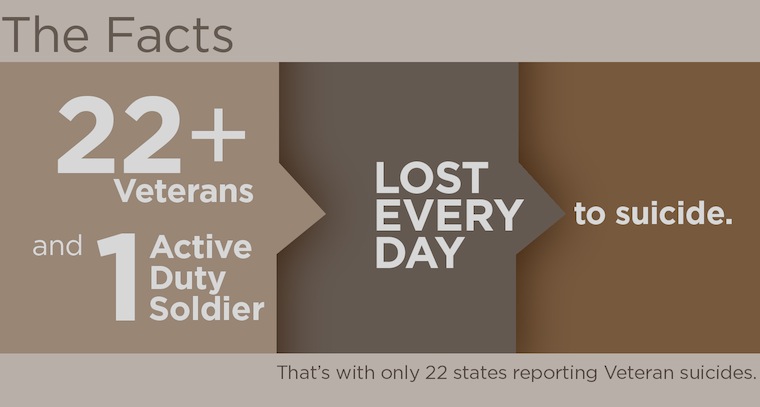According to the most widely reported statistics, every day 22 veterans and 1 active duty service person takes his or her own life. According to the DOD, in the first quarter of 2015 alone, there were 99 suicides.
In the 1st Quarter of 2015, the Services reported that there were 57 Active Component suicides and 42 Reserve Component suicides with 15 suicides in the Reserves and 27 National Guard suicides. Please refer to Table 1 for a detailed breakdown of the number of suicides within each Service and component through the first quarter of 2015. (Source: DoD Quarterly Suicide Report CY2015 Q1)
These numbers are staggering and represent a rate 50% higher than that of the civilian population. They are also very personal. For each of these tragic losses, there are families left behind to pick up the pieces. Take, for example, Stephanie Lembo, the wife of one of these lost warriors. In a heartfelt video that was recently posted to social media, Ms. Lembo describes the impact of her loss and her effort to help stem the tide of military suicide.
Of course, there are those that dispute the numbers of actual suicides and what might be causing them. But the fact of the matter is, it doesn’t matter. However you look at it, the numbers are too high. This is an identifiable population and as such it can (and should) be targeted in a big way for suicide prevention.
There are numerous resources available to help our soldiers overcome whatever demons are causing them to question whether or not they should choose suicide. But, and this is a big but, they have to be reached and convinced that they should reach out for help.
Getting a soldier or veteran to ask for help is not necessarily an easy task. While things are improving, there is still a stigma associated with seeking mental health treatment in the military. Seeking help could be interpreted as a sign of weakness and for active duty personnel, jeopardize their assignment. Most experts say that the DOD is working hard to reduce the stigma, but there is still lots of work to be done.
Despite the efforts made by the military, many soldiers must turn to their comrades in arms for help. Such is the story of one battalion of Marines that has seen more than it’s fair share of suicide.
After the sixth suicide in his old battalion, Manny Bojorquez sank onto his bed. With a half-empty bottle of Jim Beam beside him and a pistol in his hand, he began to cry.
He had gone to Afghanistan at 19 as a machine-gunner in the Marine Corps. In the 18 months since leaving the military, he had grown long hair and a bushy mustache. It was 2012. He was working part time in a store selling baseball caps and going to community college while living with his parents in the suburbs of Phoenix. He rarely mentioned the war to friends and family, and he never mentioned his nightmares.
Read the full story: In Unit Stalked by Suicide,Veterans Try to Save One Another
Others are starting groups of their own to help those in need. Veterans Johnny Primo and Casey Gray recently launched an Instagram page designed to give troubled veterans a place to turn.
But what about us? What can we do to help?
Most importantly, if you have a loved one or friend who you think is in trouble, try to talk to them about it. Encourage them to seek help and help them get in touch with a group or expert that can help them.
- Stop Soldier Suicide Help for Families
- Real Warriors Suicide Prevention Resources for Families
Those of us in the civilian population can do our part as well. Just becoming aware of the problem of military suicide is the first step. We have provided links to a number of organizations that are dedicated to helping raise awareness and solve the problem. We encourage you to learn about them. If there are others that you feel should be on the list, please let us know in the comments.
Supporting worthwhile organizations through volunteer efforts or financial assistance is another way. Most importantly, we need to keep the conversation going about how the brave men and women who put their lives on the line for us may be in crisis.
Educate yourself, reach out, and keep the conversation going. It could mean the difference between life and death.
Resources: Preventing Military Suicide
- Active Hero
- Stop Soldier Suicide
- Defense Suicide Prevention Office
- 22 Too Many
- 22toomany Instagram Page

 In the 1st Quarter of 2015, the Services reported that there were 57 Active Component suicides and 42 Reserve Component suicides with 15 suicides in the Reserves and 27 National Guard suicides. Please refer to Table 1 for a detailed breakdown of the number of suicides within each Service and component through the first quarter of 2015. (Source: DoD Quarterly Suicide Report CY2015 Q1)
In the 1st Quarter of 2015, the Services reported that there were 57 Active Component suicides and 42 Reserve Component suicides with 15 suicides in the Reserves and 27 National Guard suicides. Please refer to Table 1 for a detailed breakdown of the number of suicides within each Service and component through the first quarter of 2015. (Source: DoD Quarterly Suicide Report CY2015 Q1)








